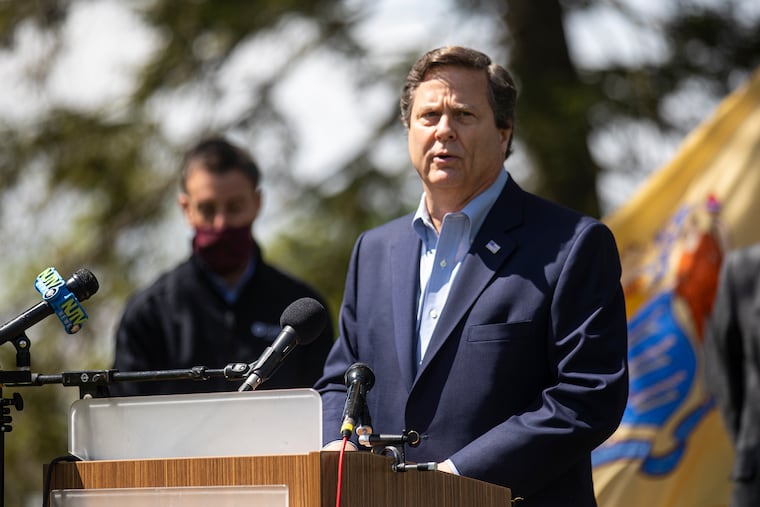Congress acts to protect the Philly region’s defense plants, giving Lockheed Martin and Boeing a boost
The new defense authorization bill includes $136 million for five more Boeing CH-47 Chinook helicopter upgrades at the company’s Ridley Park factory, which employs 4,600, making it the Philadelphia area’s largest industrial employer.

Who is winning this year’s fight over the U.S. military budget?
Is it Defense Secretary Mark Esper and Trump appointees, who say the nation spends too much on 20th-century-style tanks, trucks, and helicopters when it should invest in automated, cyber, and space systems made by such firms as Microsoft for possible use against China and Russia?
Or Congress, where members work hard to defend constituents and contributors at familiar factories run by Boeing and other industrial employers?
There’s money for both. Even though the $732 billion National Defense Authorization Act that sailed through the House Armed Services Committee with a bipartisan 56-0 vote late Wednesday is only about as big as last year’s budget (the Pentagon wanted $800 billion).
As U.S. Rep. Donald Norcross (D., N.J.), who heads the committee’s Tactical Air and Land Forces Subcommittee, said Thursday, the bill would keep some of the Philadelphia area’s biggest employers rolling through the coronavirus recession.
The bill, which differs modestly from a Senate version, includes:
$136 million for five more Boeing CH-47 Chinook helicopter upgrades at the company’s Ridley Park factory, which employs 4,600, making it the area’s largest industrial employer. The spillover work will keep staff busy at contractors such as L3Harris Technologies in Camden.
Funds for four more V-2 Ospreys, whose missions the military doesn’t like to detail. Also made by Boeing at Ridley.
$88 million for the high-energy laser with integrated optical-dazzler and surveillance (HELIOS) weapons system under development at Lockheed Martin in Moorestown. The company employs about 8,000 at a string of Pennsylvania and New Jersey facilities, including 400 at its Coatesville Sikorsky helicopter factory.
A reprieve for aging KC-10 refueling planes the Air Force hoped to retire this year. Those planes are based at Joint Base McGuire-Dix-Lakehurst in Burlington and Ocean Counties, which employs 40,000, one of New Jersey’s biggest job centers.
More military research money so Rowan University engineers can keep developing asphalt that doesn’t freeze in the Arctic, New Jersey Institute of Technology professors can improve cardboard ammunition cartridges to replace familiar brass, and Penn State researchers and others can keep working on new energy systems at the old Philadelphia Naval Base.
A 3% raise for all military personnel. Plus a provision giving military families bigger apartments if they run small day-care centers to ease the shortage at U.S. bases.
Protections for the American Federation of Government Employees and other labor unions representing more than 675,000 civilian defense workers, who President Donald Trump had hoped could be excluded from federal bargaining laws.
A tougher “Buy American” requirement so “major defense acquisition programs” use at least 75% American parts, up from the current 50%. Among the foreign manufacturers likely to lose business are engine-makers in NATO ally countries such as Italy.
Build union?
Construction labor unions see pension plans for other union workers as friendly investors in building projects that typically use union contractors.
One of the biggest, the $240 billion-asset California State Teachers’ Retirement System (CalSTRS), is extra sensitive that its taxpayer-funded investments aren’t used to undercut union labor. Its policy calls for considering “prevailing wages” — typically union wages — and promises to pay “fair wages” through “responsible contractors” using competitive bidding.
But the Philadelphia Building and Construction Trades Council complained to CalSTRS last month that the system’s near-wholly owned affiliate, LCOR, based in Berwyn, has been cutting union contractors out of recent jobs, such as a new apartment complex in Conshohocken. Union employers were not “even invited to bid on the job,” says council spokesman Frank Keel.
Among the subcontractors for the site is Florida-based Power Design Inc. The union noted that last winter, Power agreed to pay $2.75 million to the District of Columbia to settle what prosecutors called a “wage theft” complaint for failing to document minimum wages for workers wrongly classified as independent contractors or to pay required unemployment insurance. The company did not admit to wrongdoing, as part of the settlement.
Keel said the union is giving CalSTRS “the benefit of the doubt” that it didn’t check too closely whom LCOR was hiring. But it has also put the pension plan on notice that its labor policies are being watched.
“We did receive the complaint, and we are in the process of reviewing and analyzing the information,” CalSTRS spokesman Thomas Lawrence told me.
Masked
TE Connectivity, a Berwyn-based maker of electronic connectors and digital sensors with nearly 100 factories worldwide, had its Pennsylvania plants make anti-coronavirus face shields to donate to medical staff.
The company molded visors at its Lickdale works, and assembled shields in Middletown, where it also made small parts through its 3D printers, says TE spokesman Jeff Cronin. In all, more than half the 120,000 shields it has given away were made in Pennsylvania, then given to staff at Abington, Children’s Hospital of Philadelphia, Doylestown, Einstein-Montgomery, Lehigh Valley-Schuylkill, the University of Pennsylvania, Penn State-Hershey hospitals, and others picked by TE workers, Cronin said.